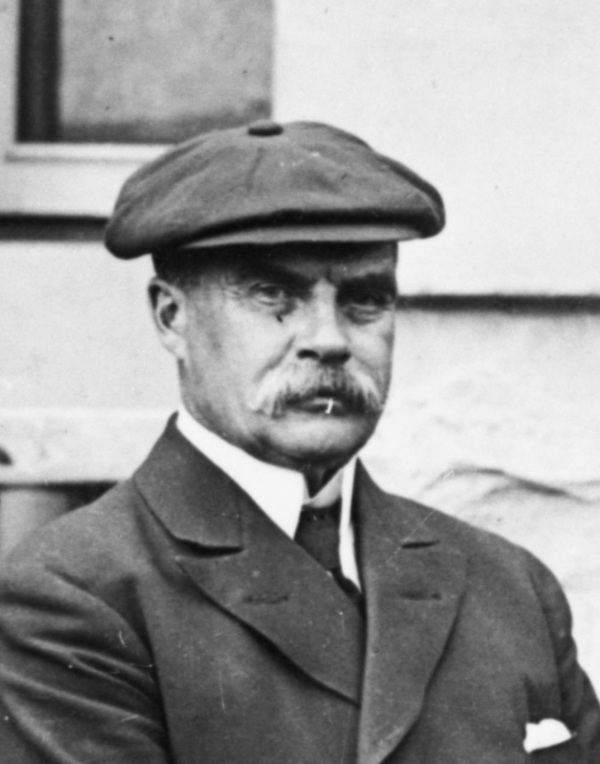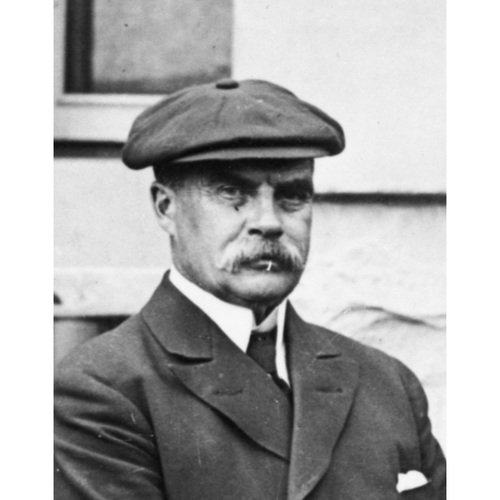
Source: Link
McCAUL, CHARLES COURSOLLES, lawyer and author; b. 17 Feb. 1858 in Toronto, third son of the Reverend John McCaul* and Emily Augusta Jones; m. first 12 May 1887 Frances Greenwood in Lethbridge (Alta), and they had a son and two daughters; m. secondly 1921 Eugenie Marie Lachapelle; they had no children; d. 10 Aug. 1928 in Edmonton.
Charles Coursolles McCaul came from a distinguished family: his father was president of University College in Toronto and his mother was a daughter of Jonas Jones*, a judge. He attended Upper Canada College and the University of Toronto, from which he graduated in 1879 with a ba, a prize in classics, and a silver medal in natural science. After attending Osgoode Hall, he was called to the Ontario bar in February 1883, but, drawn west by the Canadian Pacific Railway, he left in July for the North-West Territories.
McCaul settled for a year at North Fork Ranch near Fort Macleod (Alta). He helped run it and enjoyed riding and fishing. In 1885 he set up his law practice in town, and in June 1886 he was one of the first lawyers to be enrolled in the Law Society of the North-West Territories. Most of his business was as a proctor and notary. Active on town council, he assisted in drafting its charter and by-laws, and moved a petition for the erection of a courthouse. In addition, he served as solicitor of the South-Western Stock Association [see Frederick Smith Stimson*].
After his marriage in 1887, McCaul moved to Lethbridge, where he opened a practice on 31 May 1888 with Frederick William Gordon Haultain*, with whom he had graduated from university. Haultain left in January 1890 after his election to the territorial assembly. Named qc that summer, McCaul was in partnership with Thomas William Clarke from July 1891 to January 1892. By September 1891 he had moved to Calgary, where he joined the firm of James Alexander Lougheed; he was a partner with Costigan and Bangs by 1894 and then with James Short.
McCaul was quite active in community and legal circles in the late 1880s and 1890s. He was a founding member in 1889 of the Lethbridge Board of Trade and Civic Committee, drafted the papers for the creation in 1890 of the Lethbridge Waterworks and Electric Light Company Limited, and established the Lethbridge Turf and Athletic Association. A bencher and examiner for the law society, he edited the Territories Law Reports (Toronto) in 1897–98 and served on the commission to revise the territorial ordinances in 1898. One of the first members of the Calgary Bar Association, which often met in his office, he chaired it and sat on numerous committees and commissions. Earlier he had helped form the Lethbridge Scientific and Historical Society. His addresses to this society emphasized the need to study the climate, geology, and history of the region, which he saw as full of life and romance. He also noted the destruction of native life and its artefacts. Perhaps such interests, along with his inability to stay put, led him to leave Alberta for the Yukon gold rush in October 1899.
In Dawson, McCaul joined the firm of White and Davey. His diary for the period November 1899–April 1900, which scarcely mentions legal matters, focuses on civic affairs, social life, and mining and exploration. But Dawson could not hold McCaul either: he left for San Francisco later that spring, and then travelled throughout Europe, without his wife. They returned to Dawson briefly in 1901; by the spring of 1902 they were in Vancouver, where he was in partnership with Ernest John Deacon. The firm was dissolved because of McCaul’s ill health the following year. After more travels in England and France, in 1905 he went back to San Francisco, where he was admitted to practise. Within a year, he was once again in Fort Macleod and then, in 1907, he settled in Edmonton. He seems to have had domestic problems with his wife – in 1921 he would marry a nurse from Beaumont, Alta.
McCaul could never keep his law partners. Admitted to the Law Society of Alberta on 16 Sept. 1907, for the next 20 years he practised with George C. Valens, George W. Archibald, Friedman and Lieberman, and, finally, Stanton and Smith. From 1927 he was on his own. In his last few years, in poor health, he allowed his practice to dwindle while he travelled to London and Paris, his wife, and nurse, beside him.
Contemporaries noted McCaul’s sociability and keen mind. He joined the city club and Anglican church in every place he lived. Talented but restless, he had a flair for the literate and elegant appeal that could touch the hearts of jurors as well as readers. Several of his opening and closing addresses in the few criminal trials that he prosecuted or defended were published privately. Legal historian Wilbur Fee Bowker considers McCaul to be one of the province’s “great counsel.”
McCaul’s most important legacy is his publications – surprisingly, since few lawyers of his era became writers. In 1896 he compiled, with Horace Harvey*, a guide to the ordinances of the North-West Territories. He followed up his work on the Territories Law Reports by editing the Alberta Law Reports (Toronto) in 1907–8. In addition, he wrote on foreign judgements for the Law Quarterly Review (London) and produced several jurisprudential articles for the Canadian Law Times (Toronto). His major work, which came out in 1910, was on vendors and purchasers of real estate, but more interesting were his scientific and historical writings. “South Alberta, and the climatic effects of the Chinook winds,” published in 1888, remains a classic. McCaul’s 1884 article on the constitutional status of the territories was the first study of proclamations, statutes, and judicial precedents there. His insightful piece of 1925 on the leaders of the bench and the bar in the west is the first historical survey of his generation of lawyers.
McCaul died at his home in Edmonton in 1928.
[A short biography of Charles Coursolles McCaul can be found in A. D. Ridge, “C. C. McCaul, pioneer lawyer,” Alberta Hist. Rev. (Calgary), 21 (1973), no.1: 21–25. Other sources of biographical information are Canadian men and women of the time (Morgan; 1898 and 1912), Who’s who and why, 1917/18 and 1919/20, and PAA, 81.356 SE (L. D. Hyndman, “The legal profession in Alberta”). His obituary appeared in the Edmonton Journal, 11 Aug. 1928.
McCaul’s major published writings include Ready reference guide to the ordinances of the North-West Territories . . . (Toronto, 1896); “The constitutional status of the North-West Territories of Canada,” Canadian Law Times (Toronto), 4 (1884): 1–15, 49–61; “Notes on the Territories Real Property Act,” Canadian Law Times, 9 (1889): 25–40, 53–59 (written with John Campbell Ferrie Bown); “South Alberta, and the climatic effects of the chinook wind,” American Meteorological Journal (Ann Arbor, Mich.), 5 (1888–89): 145–59; “Addenda to the article on ‘The climate of South Alberta,’ in the August number,” Ibid., 5: 362–69; Notes on the remedies of vendors and purchasers of real estate with special reference to instalment-plan agreements, rescission, determination, relief against forfeiture (Toronto, 1910); Address in opening the case for the prosecution of Sinnisiak, an Eskimo charged with murder, before the Hon. Chief Justice Harvey and a jury, at Edmonton, Alberta, August 14th, 1917 ([n. p.], 1917); and “Precursors of the bench and bar in the western provinces,” Canadian Bar Rev. (Toronto), 3 (1925): 25–40. McCaul’s published writings were cited widely by contemporaries.
The most revealing work is McCaul’s Yukon diary of 1899–1900 in PAA, 71.338. Recollections of his early years may be found in GA in the diary and correspondence of Mrs Ella Inderwick, M 559, and in the papers of F. W. G. Haultain, M 495. McCaul’s name appears frequently in the minute books, 1890–1904, of the Calgary Bar Association in GA, M 1925. The record of his litigation, however, is weak, with the exception of some isolated cases in the Territories Law Reports (Toronto), 1900–7, and the Alberta Law Reports (Toronto), 1907–28. l.a.k.]
Toronto Daily Mail, 20 May 1887. “The chinook winds,” American Meteorological Journal, 5: 186–88. Alex Johnston, Lethbridge, from coal town to commercial centre: a business history, ed. Irma Dogterom and L. G. Ellis (Lethbridge, Alta, 1997). Law Quarterly Rev. (London).
Cite This Article
Louis A. Knafla, “McCAUL, CHARLES COURSOLLES,” in Dictionary of Canadian Biography, vol. 15, University of Toronto/Université Laval, 2003–, accessed June 23, 2025, https://www.biographi.ca/en/bio/mccaul_charles_coursolles_15E.html.
The citation above shows the format for footnotes and endnotes according to the Chicago manual of style (16th edition). Information to be used in other citation formats:
| Permalink: | https://www.biographi.ca/en/bio/mccaul_charles_coursolles_15E.html |
| Author of Article: | Louis A. Knafla |
| Title of Article: | McCAUL, CHARLES COURSOLLES |
| Publication Name: | Dictionary of Canadian Biography, vol. 15 |
| Publisher: | University of Toronto/Université Laval |
| Year of revision: | 2005 |
| Access Date: | June 23, 2025 |



